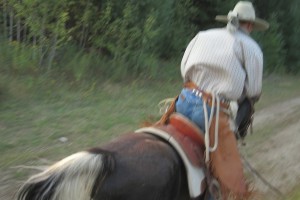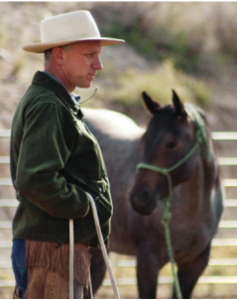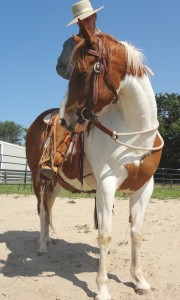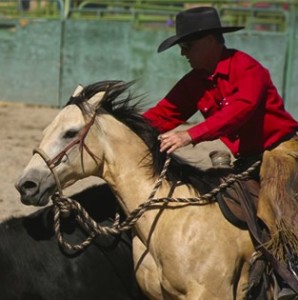 Dr. Sue McDonnell is the founding head of the Equine Behavior Program at the University of Pennsylvania and a certified Applied Animal Behaviorist. She’s a big deal at a big university with a stellar reputation for producing equine vets.
Dr. Sue McDonnell is the founding head of the Equine Behavior Program at the University of Pennsylvania and a certified Applied Animal Behaviorist. She’s a big deal at a big university with a stellar reputation for producing equine vets.
So it was dismaying to read her recent post in the Behavior Q & A section of TheHorse.com.
McDonnell was asked about the prospects for rehabbing an ex-racehorse from his bolting tendencies. Her paraphrased response:
- Bolting is a near-impossible habit to break and many trainers simply give up on horses “with this kind of behavior.”
- That said, it might help to develop a more trusting, positive relationship with the horse so that when he goes to bolt, he might stay with you instead.
- I’ve only ever known of one horse that’s overcome a bolting tendency. It was a miracle turnaround.
But in knowing the horse’s instinctual needs and reviewing top clinicians, we know:
- To bolt is to be a horse. Horses are prey animals and when they get scared, flight is their auto-response.
- Horses NEED to have that 5th gear. They need to have a rider aboard who can let it move fast and not keep it constrained when it panics.
- Solving the bolting issue has almost nothing to do with a warm and fuzzy relationship and has everything to do with training – namely, lateral flexion and the one-rein stop.
In the opening clip of 7 Clinics with Buck Brannaman, the protégé of Ray Hunt talks about Rider Fear:

Buck Brannaman
“Fear is a big thing that just owns some people. It can be overwhelming,” he said.
But instead of giving up on their horses, Brannaman implores his students to work with them at full speed and to learn how to use flexion and the one-rein stop.
“You do need to get a horse to where you can open him up and go. You gotta have the right kind of footing. A horse is pretty incomplete if you can’t just open him up and not have him lose his mind…
“I just practice dialing it up, dialing it back down, dialing it up, dialing it back down and getting them quiet again…I go like I’ve got a job. So he’s not scared to move out…Set yourself up for success.
“You practice those things. You need to know you can.”
Video footage shows a woman working in a round pen. Her horse starts to panic. His spinning turns into racing and around the pen he goes. The woman never pulls on the reins but allows him to churn away. When he starts slowing, she strokes his neck. When he stops, she loves on him.
Photo at right shows Dr. Steve Peters working on lateral flexion with his horse, Jodi. By simply learning to bend up front as well as disengage her hind quarters with his gentle contact, Jodi will accept a one-rein stop later on as the training evolves.
Buck on flexion and the one-rein stop:
“In order for you to advance, you have to do this without a problem. This will be absolutely necessary for you to do…If you can’t walk, trot, and canter and then stop with a one-rein stop, then you ought to practice every chance you get….It ought to be something that you would bet your life on.”
You need the skill and confidence to NOT constrain a horse when it bolts or panics.
As Martin Black wrote in Evidence-Based Horsemanship:
“By pulling on the head, we make horses feel they can’t get away which causes more panic. In some situations, horses may only need a short distance to feel safe but when [constraint] follows them, they continue their fight for freedom.”
McDonnell was right when she told readers matters will only get worse when the rider feels afraid or insecure. But it’s the fear, not the horse that they need to rein in and work on.
Do you have a horse who likes to bolt?
How often do you gallop with him?
How often do you let him move when something frightens him?
As one horse owner said: “A horse was never running off with me, as long as I was riding right along with it.”
Knowledge and practice, in the form of one-rein stops, flexion and hind-quarter disengagement, will save the horse and the partnership.



You are a fool if you train a horse to stop with a one rein stop. The one rein stop is designed to take away the horses balance which adds to his lack of confidence.
If you take a horse down a long steep hill at a trot or a lope, a horse trained to stop with a one rein stop can never have any confidence and will rightly be scared to death.
It is only a straight stop that build confidence in a horse,
A one rein stop destroys confidence.
Flexions are the movement of the jaw, which happens when the horse is calm and in balance, not the chomping of the bit that one sees today.
How did you test you finding? Did you test one rein stops stops on steep hills and rugged country and compare them to straight stops? I have and I avoid training a one rein stop like the plague. If the horse makes a mental mistake and attempts a one rein stop, as he was trained, in a tough spot it is deadly. I bought a horse trained like that, He was just too dangerous to ride.
The 1 rein stop is designed to take away the horse’s forward power. Its very effective, and when done CORRECTLY, it builds confidence rather than destroys it. It helps a horse soften though the ribs, relax and release tension. I doubt you would catch any of the master horsemen mentioned above, doing it halfway down a steep hill. Expertise is knowing which technique to use at which time in which situation. Just because you can reach down and take a rein, does not mean you understand lateral flextion.
A trained horse should be able to stop with 1 rein, 2 reins or no reins.
The fact that your horse that was “trained like that” was too “dangerous” to ride, sounds like more of a reflection of your own lack of skill and understanding than any downfall of the one rein stop.
Been training all my life, Free Rein, and never heard of this one way stop, or tuning your horse to stop, mine is trained so when I lay back just a little, she puts on her brakes with no problem, sometime we ride bridleless, but I do agree with you on that comment, so many people ride, but no nothing about building confidence up in their Horse…I’m a little bewildered Buck added that in? I can see it in starting a 2 year old, but I never used the one rein their talking about, Been training for 55 years and first time I ever heard this..
You don’t know what you are talking about. Your horse wasn’t messed up from having been taught the one-rein stop. You are blaming the emergency brake for the faulty vehicle. Educate yourself about horsemanship and training before you make such ridiculous comments.
I have to say that the one rein protects the rider. Its not about the horses confidence it about the safety of the rider. I wass in a terrible accident at the age of 47. I grew up on a large horse ranch. While my horse bolted and if the horse would of know the one rein stop it would of save me from permanent injuries and almost dying 4 times while in intensive care. I have permanent brain injury. For a year i could not remember what happen 10 minutes ago. After 5 years I improved but i cannot go back to work as a nurse. From this point forward all my horses know the one rein stop. I had to use it 1 year ago on a mare that bolt. In that moment my past accident raced back to my mind in intense fear. I told my self not again. I did the one rein stop and it all came to my safety. I will tell u my horse never loss any confidence.
I heard of a college girl who did this one rein stop on her horse when he spooked and took off with her. She caused the horse to go off balance, he fell and she was killed. Obviously she did not do so according to these trainers. I have never used a one rein stop but rather, I let m my horse take off and run until he feels safe, which happens rather quickly. He’s a mustang, and when he bolts, it’s not for long, he will stop on his own, turn around to see if anything is chasing him, and if not, he settles rather quickly. I often gallop him in fields, as it’s my favorite gait and he absolutely loves it, he throws in a few bucks in for good measure.
A one-rein stop is a very useful tool when done correctly, and detrimental, as mentioned before, when done incorrectly. The benefit of teaching a horse to stop with one rein and keep himself balanced and upright in doing so develops his confidence, develops the beginnings of self carriage, and keeps him from feeling the claustrophobic attack of the terrified rider prying back on both reins. It is not about “grabbing” the horse and pulling him around, as yes, you can certainly flip a horse over, or produce one very afraid and braced horse.
As in all things, there is a right way and a very wrong way, and unfortunately, many will only see it done wrong before they’ve formed an opinion. I can’t blame those who have formed a negative opinion on the matter when you see what is so often practiced.
Mechanically, the one rein stops disengages the hind quarters and stops the forward impulsion. Lateral flexion is essential, otherwise the horse loses its balance and you’re in for a wreck. That is how people get hurt. They try it without having worked on it.
Your horse needs to be soft in your hands. The one rein stop needs to be executed with a cool head, not in a panic “ripping his head off.”
Be safe.
Great comment, Brian! Thanks for weighing in.
I love ur comment. You are so right
criticizing the idea versus the individual – there are as many ways to work with a horse as there are individuals. Many ideas have also been discarded based on an increased understanding of how horses behave, think and learn.
but attacking an idea should also come with a good thesis of why… not just that is what I have always done. Attacking the person does nothing.
I believe to be good with horses you have to be great with people, there is always a person to go with any horse you happen to be training.
I’ve been training my own horses for 55 years and never knew about the one rein stop until my horse (an Australian Brumby) bolted. Twice. First time I felt she had a very good excuse and she did stop without incident, eventually. Second time she was fresh and being stupid. I did some reading and was given two options. Shoot her or teach her the one rein stop. I started working on her flexion from the ground and now from the saddle. She is so much more responsive. Being a Brumby she loves to please but I’ve yet to gallop her so haven’t practiced the one rein stop yet. Can it be practiced at a slower gait? At 67 I like to take things fairly quietly. And my Brumby’s lazy. Brilliant little horse and I noticed that another person had a mustang that bolted. Perhaps the flight response is more accute in wild horses.
Leonie, thanks for your comment. As I see it, one-rein stops can be practiced at any gait.
My 10 year old Friesian/Morgan cross has been diagnosed with “standing scared” issues. In other words, he will stand still for almost anything..but given his choice he would rather bolt to get away…I have been doing extensive ground work with him, had 3 trainers, all of which think he will not be safe to ride due to his unpredictable behavior with bolting. Trainer said he was never taught to ride and needs to start from the beginning and learn to ride through scary things…so, I continue to build on his groundwork..I welcome comments!
Carol, I could have written your comment myself. My Friesian/Arab tries so hard, but he is full of anxiety and is always on high alert if we even get close to the perimeter of his pasture. He thinks there are mountain lions everywhere outside the pasture, and sometimes in the pasture, and the one thing I can count on is that he will spook – big! I’ve had him to trainers, too, with no improvement in the spookiness. I’ve also done lots of groundwork, and I’m currently using Warwick Schiller’s videos. I still don’t feel safe, and doubt I ever will. His other issue is that he slips very easily. Are these all Friesian traits?
I have a friesian QH cross, who, when I got him, was characterized as bombproof. Read the bomb proof versus shut down article. That was him a little bit. However, he is really brave. When he’s frightened he spooks more than bolts. I did read that Friesians tend to be more thoughtful and less reactive to things, which in turn, causes people to push them too far, thinking the horse should be okay with everything. In this case they can develop a bolting habit. Perhaps yours was pushed earlier in its training. My guy benefits from slow introductions to things, and then he needs to investigate them thoroughly, then he’s okay with It.
I am a cautious rider and I feel fearful if riding a fearful horse, so I went out and found a level headed horse. Now, my horse has on occasion bolted when he thinks there is a predator in the bushes, but this has happened only a few times in 16 years. When he bolts, I let him go, and he stops after a short run to turn around and see if something is truly after him. We gallop often and I encourage him to run as fast as he can because I love it. He loves it too. I have ridden him in places that would absolutely scare the hell out of most equines and I have total confidence in my horse. Unfortunately , I derive confidence from my horse and not the other way around, although he does trust me. I guess we trust each other. It ‘s a tough road getting to that point. If anyone is interested in knowing what breed he is, he’s a mustang and when he was young, was the most agile, surefooted horse around. We fell in many a ground hog hole with hardly a step missed. I love this horse and hate to see him getting old.
I have had 5 different horses bolted on me and Ive only been riding for 6mos. I heard of the one reign but Ive never used it because I feel that my horses are stronger than me. Trying to slow them down on a half halt , legs and seat didnt work so I was lucky enough to think that I shld just make sure I feel balanced otherwise I will fall. The first time it happened I tried all the stops except the one reign. Since my horses didnt slow down I grabbed the reigns in one hand and other on my saddle just to feel balanced. i went for the ride and then the horse stopped but I was smiling the whole time. Honestly, I didnt knw what was happening. I didnt even knw it was bad until my teacher told me I was A+++ for not panicking and having a good balance and form. Ever since then I just made sure that when a horse bolted that I dont add stress to him, made sure I was balanced and steer him to safety. Maybe I was lucky and I do think so but I still have not fallen from bolting. I have fallen from 1 jumps only because I was unbalanced and I didnt knw I could grabbed on horses mane. After knwing that I could, I just grabbed on to their mane and hang on to their neck. Thankfully I have not fallen since. The 2nd time Ive fallen, the horse just pulled me while sitting. I guess he didnt like me jajajajaja I was ok, however, I now wear a protective vest for security. 😂